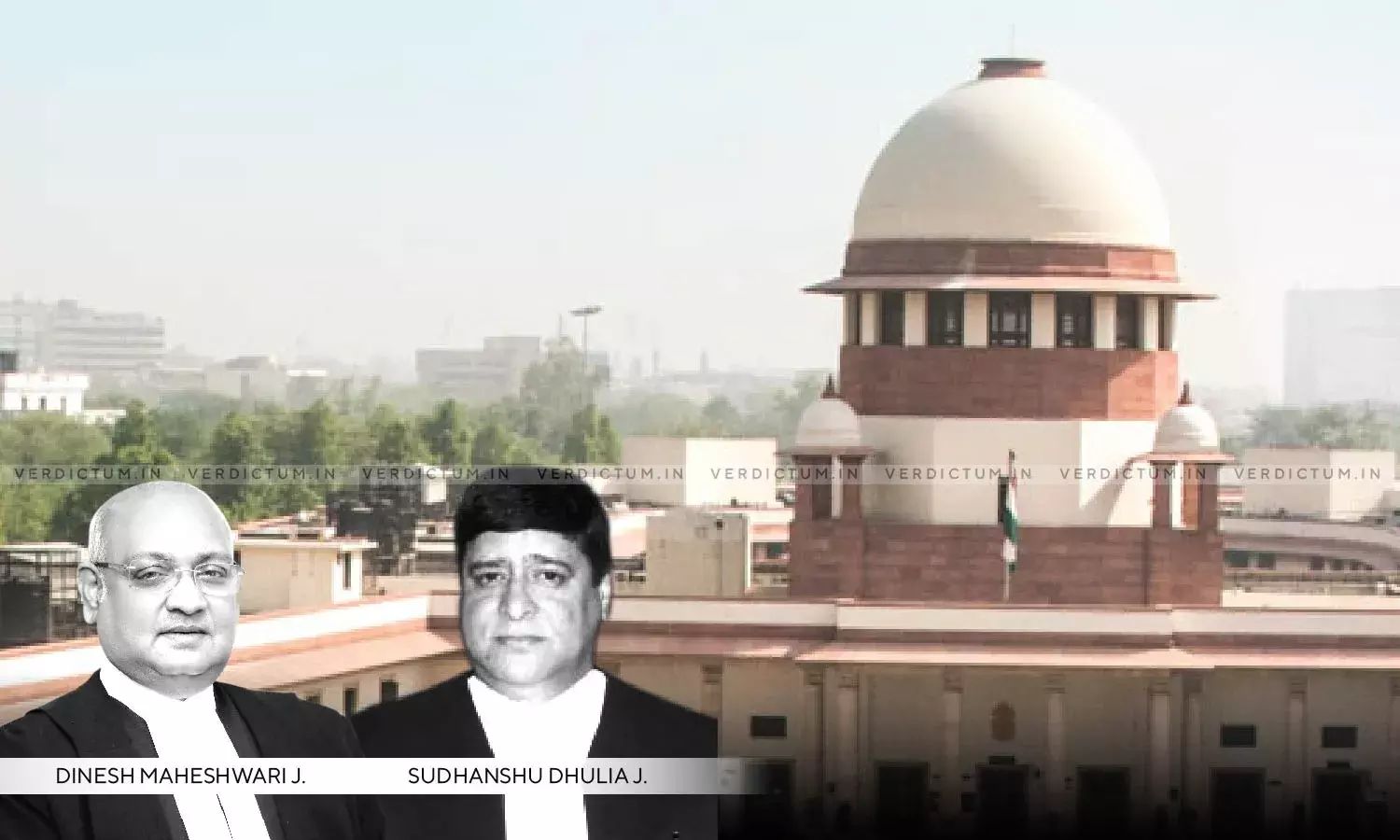Burden To Prove Mental Incapacity Is On Defence- SC Upholds Conviction Of Man For Murder Of His Children

A Supreme Court Bench of Justice Dinesh Maheshwari and Justice Sudhanshu Dhulia has upheld the conviction of a man for the murder of his minor children.
In that context, the Court said that "It is, of course, the duty of prosecution to lead the primary evidence of proving its case beyond reasonable doubt but, when necessary evidence had indeed been led, the corresponding burden was heavy on the appellant in terms of Section 106 of the Evidence Act to explain as to what had happened at the time of incident and as to how the death of the deceased occurred."
Rejecting the Appellant's plea of mental incapacity, the Court specified that "the burden to prove that as a result of unsoundness of mind, the accused was incapable of knowing the consequences of his acts is on the defence, as duly exemplified by illustration (a) to the said Section 105 of the Evidence Act."
In this case, an appeal was directed against a judgment passed by the High Court dismissing the appeal against the judgment of conviction and order of sentence. The Appellant had been held guilty of offences punishable under Sections 302 and 201 of the Indian Penal Code, 1860, and was awarded varying punishments, including imprisonment for life for the offence under Section 302 of the IPC.
The allegation against the Appellant was that he strangulated and killed his two minor sons and threw the dead bodies into a canal. He also attempted to project that it was a case of accidental drowning. It was also alleged that the appellant was a drunkard who doubted the chastity of his wife and suspected that the children were not his sons.
The Apex Court deemed it fit to analyze principles relating to (i) circumstantial evidence; (ii) burden of explanation; (iii) hostile witness; and (iv) motive.
Subsequently, the Court held that "When the facts established by the evidence on record and the surrounding factors are put together, the chain of circumstances had unfailingly been that the deceased children were lastly seen alive in the company of the appellant; they died because of manual strangulation and obviously, their death was homicidal in nature; their dead bodies were recovered from the canal; and the appellant attempted to project that they had accidentally fallen into the canal. In the given set of circumstances, when the deceased children were in the company of the appellant, who was none else but their father and when their death was caused by manual strangulation, the burden, perforce, was heavy upon the appellant to clarify the facts leading to the demise of his sons, which would be presumed to be specially within his knowledge. Thus, the principles of Section 106 of the Evidence Act operate heavily against the appellant."
The Court also specified that the absence of motive by itself cannot be a ground to reject the prosecution's case. In that context, the Court proceeded to say that "when the evidence on record unambiguously proves the guilt of the accused-appellant, the factor relating to motive cannot displace or weaken the conclusions naturally flowing from the evidence. Moreover, the present case cannot be said to be of want of motive altogether. Differently put, in our view, when all the facts and circumstances are taken together, the present one is not a case where there had been any missing link in the chain of circumstances, leading only to the conclusion of the guilt of the appellant."
As to the plea of mental incapacity preferred by the Counsel for the Appellant, the Court reiterated that the burden to prove that as a result of unsoundness of mind, the accused was incapable of knowing the consequences of his acts is on the defence. In furtherance of the same, the Court held that "The evidence on record, taken as a whole, at the most shows that the appellant was addicted to alcohol and was admitted to the rehabilitation centre for de-addiction. However, there is absolutely nothing on record to show that the appellant was medically treated as a person of unsound mind or was legally required to be taken as a person of unsound mind." The Court also noted that the plea of unsoundness of mind and, therefore, the benefit of Section 84 IPC was never taken in the trial nor was any evidence led in this regard. It was further noted that not even a remote suggestion was made to any witness examined for the prosecution about the alleged mental incapacity of the Appellant.
Consequently, the Court dismissed the appeal, and said that "we are satisfied that there is no infirmity in the findings concurrently recorded by the Trial Court and the High Court that the prosecution case is amply established by cogent and convincing chain of circumstances, pointing only to the guilt of the appellant, who caused the death of victim children, his sons, by strangulation and also caused the evidence of offence to disappear by throwing the dead bodies into the canal. The submissions evolved for the purpose of the present appeal that the appellant be extended the benefit of alleged want of mental capacity also remain baseless and could only be rejected. Therefore, no case for interference is made out."
Cause Title: Prem Singh v. State of NCT of Delhi

